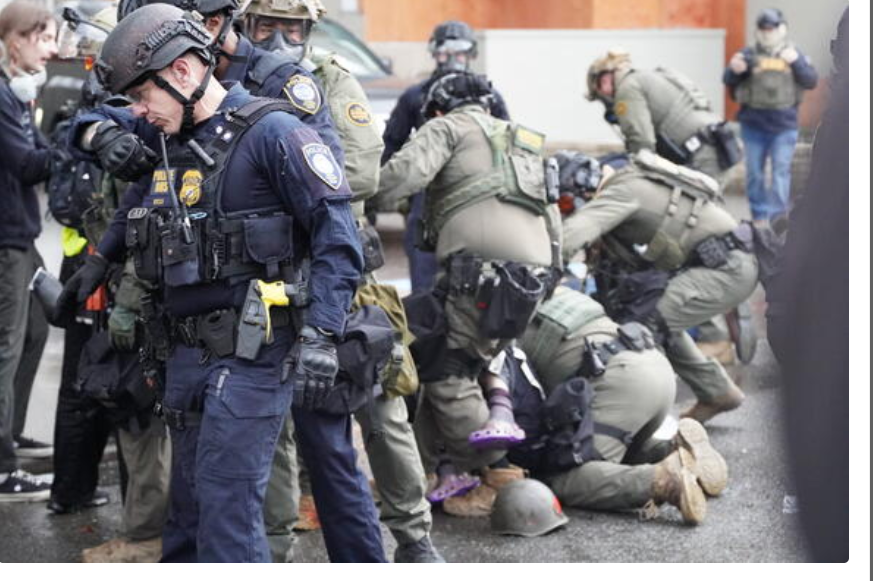A series of tense clashes between protesters and federal agents outside Portland’s Immigration and Customs Enforcement (ICE) facility has reignited debate over whether federal officers can — or should — be prosecuted under Oregon law.
The most recent confrontation, on October 12, 2025, drew national attention after reports surfaced of a 19-year-old woman being pepper-sprayed, an elderly couple shoved to the ground, and tear gas canisters fired into crowds without warning. Portland officials allege that these actions violated Oregon’s strict crowd-control laws — rules that even local police must follow under reforms passed after the 2020 racial justice protests.
However, constitutional limits and a 19th-century Supreme Court precedent are proving major obstacles for Oregon officials who want to hold federal agents accountable.
Also Read
Democrats Call for Accountability
Oregon’s top Democratic leaders — including U.S. Senators Ron Wyden and Jeff Merkley — have urged state and local law enforcement to pursue charges where possible, arguing that federal agents are not above the law.
“Donald Trump’s federal agents should know they will be held legally accountable if they break the law in pursuit of extralegal orders in Portland or anywhere else in America,” Wyden said in a statement.
Wyden’s office later confirmed he supports arrests of federal officers who violate state laws on use of force. Oregon’s two U.S. congresswomen, Suzanne Bonamici and Maxine Dexter, echoed that stance. Dexter called the situation “a five-alarm fire,” insisting Oregon must use “every tool available to protect our communities.”
Former House Speaker Nancy Pelosi, D–California, also endorsed the idea after similar incidents occurred in her home state. Meanwhile, Colorado’s attorney general recently launched an investigation into a federal agent accused of using a chokehold during a protest outside an ICE facility.
Local Police and Prosecutors Say Hands Are Tied
Despite political pressure, local officials in Portland say they have limited power to act.
Multnomah County District Attorney Nathan Vasquez cited the U.S. Constitution’s Supremacy Clause, which establishes that federal law overrides conflicting state law. “Prosecution of federal officers for how they perform their job is not a tool available to me,” Vasquez said, even as he expressed concern about the agents’ actions.
The Portland Police Bureau (PPB) has also been cautious. Commander Franz Schoening testified in court that federal agents appeared to violate Oregon law by deploying tear gas without sufficient warning. But PPB spokesperson Mike Benner said officers must still follow Bureau rules and both state and federal law — a delicate balancing act that leaves local police wary of direct confrontation with federal agencies.
Legal and Historical Hurdles
Legal scholars point to the Supremacy Clause and an 1890 U.S. Supreme Court ruling as the central roadblocks. In that case, a federal marshal who killed a man attacking a Supreme Court justice was granted immunity from state murder charges in California. The ruling established that federal officers performing their duties in “necessary and proper” ways could not be prosecuted by states.
“This interpretation gives federal agents very broad protection,” said Tung Yin, a professor of law at Lewis & Clark Law School.
However, the immunity is not absolute. Yin noted that state prosecutions could proceed if a court determines the agent’s actions were outside the scope of official duties or unnecessary for their mission.
A rare example occurred in 2001, when the 9th Circuit Court of Appeals allowed manslaughter charges to move forward against an FBI agent involved in the deadly Ruby Ridge standoff. The case was ultimately dropped, but the court’s ruling left open the door for future accountability.
Yin said Oregon could use local police investigations to preserve evidence for potential civil rights lawsuits or future prosecutions. “If someone fires pepper balls or tear gas without warning, that can be documented,” he said. “Claims like ‘I felt my life was in danger’ would need to be proved — not assumed.”
State Officials Explore Legal Options
Oregon Attorney General Dan Rayfield has already shown interest in challenging federal authority in state courts. His office is currently arguing a case against a Drug Enforcement Administration (DEA) agent who killed a Salem cyclist while speeding through a stop sign during a surveillance operation.
“We are committed to using every tool we have to hold the federal government accountable when it oversteps,” Rayfield said. “Sometimes that means thinking creatively to ensure Oregonians’ rights are protected.”
Governor Tina Kotek is reportedly discussing potential legislation for 2026 that could clarify how state prosecutors can respond to federal agents who break Oregon law. Kotek’s spokesperson Roxy Mayer said the governor “has not shied away from protecting Oregon communities from the Trump administration’s abuses of power.”
Federal Response and Rising Tensions
Neither the Department of Homeland Security (DHS) nor ICE responded to requests for comment. However, the U.S. Department of Justice has previously argued that arresting federal agents for performing their duties is “illegal and futile.”
Federal agencies have also disputed Oregon officials’ accounts of protest incidents, claiming their officers faced violent threats. But DHS has failed to provide evidence supporting its assertion of a “1,000% rise in assaults” against federal officers.
Trump administration lawyers have also walked back earlier filings exaggerating the number of federal personnel deployed at Portland’s ICE facility.
A Political Flashpoint
The debate has turned into a national flashpoint over the limits of federal power. Oregon’s Democrats have joined other states, including Illinois and California, in calling for new state-level accountability measures.
U.S. Rep. Suzanne Bonamici said she supports using local laws to hold agents accountable if they act “outside the scope of their official duties.” Sen. Jeff Merkley’s office added that state and local authorities “have legal tools to protect Oregonians’ civil rights.”
But for now, legal experts say meaningful prosecutions remain unlikely without congressional reform or a major shift in judicial interpretation.
“Unless a court decides that an agent’s actions were clearly unauthorized, states will continue to face an uphill battle,” Yin explained.
The Path Ahead
Even without arrests, Oregon’s growing scrutiny of federal enforcement tactics may have long-term effects. Local investigations, video evidence, and public documentation could support future civil rights cases or help shape new laws limiting how federal agents operate within the state.
Meanwhile, protesters and advocacy groups continue demanding answers. “The people of Oregon deserve accountability,” said one activist with the Oregon Justice Alliance. “No badge — federal or local — should be a shield from the law.”
As federal and state tensions rise, one thing is clear: Oregon’s effort to charge federal agents under state law could reshape not only the state’s relationship with Washington, D.C., but the national conversation about federal power, civil rights, and accountability in American law enforcement.












